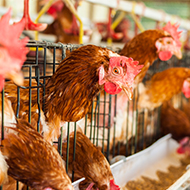Prevention zone declared after avian flu outbreak
Seven cases have been confirmed since the current outbreak began in November.
An Avian Influenza Prevention Zone (AIPZ) has been declared to reduce the risk of the disease spreading following an outbreak of cases.
The zone applies to the East Riding of Yorkshire, the City of Kingston upon Hull, Lincolnshire, Norfolk and Suffolk. Regardless of the size of their flock, all bird keepers within the zone most follow strict biosecurity measures.
The requirements that keepers must follow include preventing access by poultry to ponds and watercourses, ensuring all feed and water is not accessible to wild birds, and cleansing and disinfecting clothing, footwear, equipment and vehicles both before and after contact with poultry and captive birds.
However, it is not compulsory for birds to be housed, unless they are within a 3km Protection Zones around an affected premises.
The AIPZ has been introduced following an outbreak of cases of avian flu detected in commercial poultry and captive birds, as well as a rise in reports of mass mortality in wild birds. The zone will be reviewed regularly and remain in place until further notice.
Aled Edwards, head of England field delivery at the Animal Plant Health Agency, said: “The introduction of an Avian Influenza Prevention Zone means regardless of the number of birds you keep, you are required to meet enhanced biosecurity requirements to protect your birds from this highly infectious disease.
“Scientists, vets and field teams from the Animal and Plant Health Agency are working hard to help tackle the spread of avian influenza and ensure bird keepers are kept up to date and supported.”
Clinical signs of avian flu infection must be reported in England to the Defra Rural Services Helpline on 03000 200 301. Cases in Wales should be reported on 0300 303 8268. In Scotland, the local Field Services Office must be contacted.
A full list of the requirements for bird keepers in the AIPZ can be downloaded here.
Image © Shutterstock



 An Avian Influenza Prevention Zone (AIPZ) has been introduced across Wales.
An Avian Influenza Prevention Zone (AIPZ) has been introduced across Wales.